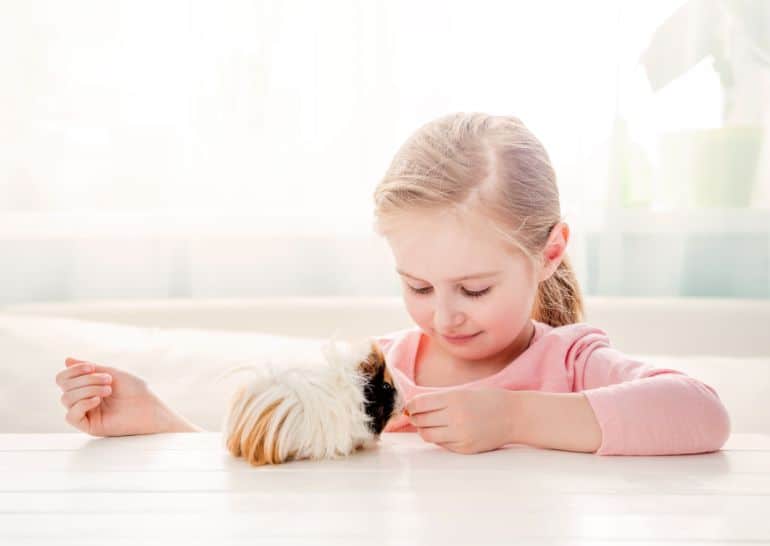Guinea pigs are herbivores, which means they mainly eat vegetables and fruits. As a responsible pet owner, it’s essential to ensure that their diet is well-balanced and nutritious.
While guinea pigs can eat a wide variety of vegetables and fruits, not all of them are safe or healthy for them. In this blog post, we will explore whether guinea pigs can eat radishes, their nutritional value, potential benefits and risks, and how to feed them to your furry friend.

Are Radishes Safe for Guinea Pigs to Eat?
Radishes are a root vegetable that belongs to the Brassicaceae family, also known as the mustard family. They come in a variety of shapes, sizes, and colors, such as red, white, or black. Radishes have a crisp texture and a slightly spicy and tangy taste, making them a popular addition to salads, sandwiches, and other dishes.
Yes, guinea pigs can eat radishes. However, like any other food, radishes should be given in moderation and as part of a varied and balanced diet. Here are some things to consider:
Nutritional Value of Radishes for Guinea Pigs
Radishes are low in calories and high in fiber, making them an excellent addition to your guinea pig’s diet. They also contain vitamin C, an essential nutrient for guinea pigs, as they cannot produce it on their own. Vitamin C helps boost their immune system, aids in wound healing, and supports healthy skin and coat.
Potential Benefits of Feeding Radishes to Guinea Pigs
Feeding radishes to your guinea pig can provide several benefits, such as:
- Improved digestion: The fiber in radishes can help regulate your guinea pig’s digestive system, preventing constipation and diarrhea.
- Boosted immune system: Radishes are rich in vitamin C, which helps support a healthy immune system.
- Hydration: Radishes have a high water content, which can help keep your guinea pig hydrated.
Possible Risks of Feeding Radishes to Guinea Pigs
While radishes are generally safe for guinea pigs to eat, there are some potential risks to consider:
- High oxalic acid content: Radishes contain oxalic acid, which can interfere with calcium absorption and lead to bladder stones or urinary tract problems if given in large quantities. To avoid this, limit the amount of radishes your guinea pig eats and ensure they have access to fresh water at all times.
- Digestive upset: Some guinea pigs may not tolerate the spicy and tangy taste of radishes, leading to digestive upset, such as diarrhea or bloating. If you notice any adverse effects, stop feeding radishes to your guinea pig.
How to Feed Radishes to Guinea Pigs?
Before feeding radishes to your guinea pig, here are some things to keep in mind:
Preparation and Serving Suggestions
- Wash radishes thoroughly with water to remove any dirt or pesticides.
- Cut radishes into small, bite-sized pieces to prevent choking.
- Serve radishes as a treat or snack, not as a primary food source.
- Mix radishes with other vegetables and fruits to provide a balanced diet.
Frequency and Quantity of Feeding Radishes to Guinea Pigs
Radishes should be given in moderation to avoid any health issues. A good rule of thumb is to offer one or two small pieces of radish once or twice a week. If your guinea pig shows any signs of digestive upset, reduce the amount or stop feeding radishes altogether.
Alternatives to Radishes for Guinea Pigs
While radishes are safe and healthy for guinea pigs to eat, it’s always good to provide variety in their diet. Here are some other vegetables and fruits that are suitable for guinea pigs:
Other Vegetables and Fruits Suitable for Guinea Pigs
- Leafy greens: such as lettuce, kale, spinach, and parsley
- Bell peppers
- Carrots
- Cucumbers
- Zucchini
- Apples
- Blueberries
- Bananas
Conclusion
In conclusion, guinea pigs can eat radishes as part of a varied and balanced diet. Radishes are rich in fiber and vitamin C, which can provide several health benefits to your furry friend.
However, it’s essential to feed them in moderation and watch out for any adverse effects. Always consult with your veterinarian if you have any concerns about your guinea pig’s diet or health. Remember, a healthy diet is crucial for a happy and healthy guinea pig!
- How Long Do American Eskimo Dogs Live? Important Factors and Care Tips - September 29, 2023
- Do American Bulldogs Need Grooming? Essential Tips and Care Guidelines - September 29, 2023
- Do Bengal Cats Enjoy Playing? Essential Tips for Keeping Them Active - September 29, 2023